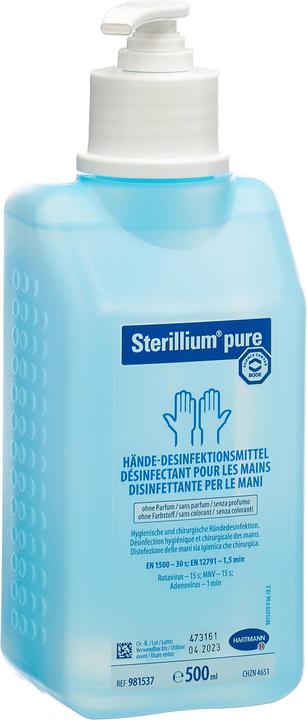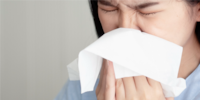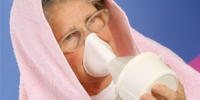

Wintertime: ‘tis the season for runny noses and RSV
RSV is the most common cause of respiratory infections in newborns. Infants, children and even senior citizens can also be affected. Starting this winter, our youngest ones can be better protected.
In autumn and winter, snotty noses are everywhere. Some children seem to have a runny nose all year round. This isn’t a problem, provided they’re doing well.
For newborns and infants, it’s a lot harder to deal with a blocked nose, as they rely fully on their nose for breathing for the first 6–12 months of their life at least. In general, they’re unable to use their mouths to breathe (crying is the only way they occasionally get some air through their mouths). This more pronounced separation of the airways and oesophagus in infants makes sense, as it reduces the likelihood of them inhaling food. The downside is that respiratory infections can lead to a blocked nose.

One virus has been known to fill entire paediatric A&E units in the winter months and can be very distressing – the respiratory syncytial virus, or RSV for short.
RSV exists the world over, occurs more frequently in the winter months and is contagious roughly one day before symptoms start. Those affected often have clear and thick mucous that’s fast to block the nose and upper airways of very young children. On top of coughing, fever and occasionally conjunctivitis, RSV can cause inflammation in the lower airways. Infants in particular often have a middle ear infection at the same time. While children under the age of one can be severely affected, older children often only experience a tedious cough. Unfortunately, even people with mild symptoms are contagious. Once you’ve picked up the virus, the disease usually breaks out within a week (2–8 days). Elderly people and individuals with a weak immune system can develop severe pneumonia if they catch it.
RSV is the main cause of hospitalisations in newborns and infants, with around 1 in 100 children (the younger the more likely) being severely affected. Between 2016 and 2021, this was the case in 3,000 to 6,000 cases per year in Switzerland. The numbers are similar throughout Europe.
Unfortunately, you don’t become completely immune to RSV after you’ve had it and can keep becoming infected.
RSV – how to avoid infection
As the virus is in the mucous and droplets when you cough, you want to avoid being directly coughed at. The virus can survive on surfaces for around 20 minutes, so it’s worth regularly cleaning and disinfecting your hands and shared surfaces. Keep in mind to always keep cleaning products out of the reach of children.
RSV – what to do if your child’s caught it
The most important thing to do if your child is having difficulty breathing because of their blocked nose is to clear the airways. You can do this by generously rinsing the nose with a saline solution, for example. Don’t worry if your child spits out or swallows the solution. The main thing is that you manage to unblock the nose this way. Admittedly, this isn’t the most popular method with children.
Some parents prefer to use gadgets to get the mucous out of their children’s noses. What’s important here is to avoid irritating or injuring the nasal mucosa in the process.
While the actual illness usually lasts 3– 12 days, the cough can sometimes last for 4 weeks after the illness. As with other respiratory infections, you can try to relieve the pain and support breathing with cool, humid air. Propping your child up in bed can also make breathing easier.
RSV – how to avoid it
Since 2023, two RSV vaccines (Arexvy and Abrysvo) have been approved for over-60s in the European Union. Infants are also protected by Abrysvo if the mother was vaccinated during pregnancy. In the USA, the vaccine’s recommended during the 32nd and 36th week of pregnancy. Some supplementary insurances in Europe and Switzerland cover part of the costs.
For newborns at increased risk (congenital heart defects and severe lung diseases), this was already recommended in the past and vaccines (Palivizumab, Synagis) required being injected monthly during the winter. Since 2024, the monoclonal antibody Nirsevimab (sold under the brand name Beyfortus) is recommended for all newborns and infants up to 6 months of age for their first winter. It’s injected once in the autumn and should protect your child against RSV during the winter. The costs of the vaccine for outpatient therapy are covered by basic insurance and are also reimbursed by compulsory healthcare insurance in Switzerland since September 2024.
Sources (in German): https://www.rki.de/DE/Content/Infekt/EpidBull/Merkblaetter/Ratgeber_RSV.html
https://www.bag.admin.ch/bag/de/home/krankheiten/krankheiten-im-ueberblick/rsv.html#1669019361
11 people like this article
Family and paediatrician, family counselling for big and small people. Loves emergency care and rescue transports and the interface with basic and clinical research. Journalism started with the school newspaper, later stations at the Deutsche Welle, the Deutsches Ärzteblatt, author of scientific publications.







